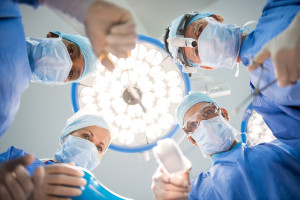 Nowadays there are many surgery options available depending on an individual’s diagnosis. Unless it is an emergency surgery, the physician will usually discuss their recommended surgery plan with the patient in advance. Based on medical tests such as blood tests, MRIs, CT scans, X-rays or any other laboratory work available the physician will decide which surgery method they believe will have the best outcome for their patient. Below is more information on the different types of surgery:
Nowadays there are many surgery options available depending on an individual’s diagnosis. Unless it is an emergency surgery, the physician will usually discuss their recommended surgery plan with the patient in advance. Based on medical tests such as blood tests, MRIs, CT scans, X-rays or any other laboratory work available the physician will decide which surgery method they believe will have the best outcome for their patient. Below is more information on the different types of surgery:
• Optional or elective surgery – Elective surgeries are not usually necessary for the individual to stay in good health. They are non-emergency and planned in advance. A wide range of surgeries can be elective. Most cosmetic surgeries such as breast implants or nose jobs are elective. Women sometimes choose to have elective cesarean births. Other surgeries such as organ donation, scoliosis surgery, tonsillectomies and other minor surgeries can also be considered elective.
• Required surgery – Surgery which needs to be done in order to retain quality of life. As opposed to urgent or emergency surgery, required surgeries do not need to be performed immediately. Examples of required surgery are kidney stone or tumor removal.
• Urgent or emergency surgery – When a patient’s condition is life threatening, surgery is considered emergent. Emergency surgeries must be performed immediately, even when the patient is unconscious and cannot give consent. Examples include trauma and appendicitis. Life-threatening conditions can occur during labor and delivery which may require emergency surgery.
There two main classes of surgery
• Major – Major surgeries are usually extensive and warrant an overnight or extended stay in a hospital. These surgeries include extensive work such as entering a body cavity, removing an organ or altering the body’s anatomy. Patients undergoing major surgeries usually require anesthesia or respiratory assistance and sometimes even both. Examples of major surgery include cardiac operations, any bowel cavity operations, reconstructive surgery, deep tissue procedures, any transplant procedures, as well as any surgeries in the abdomen, chest or cranium.
• Minor – Minor surgeries are generally superficial and do not require penetration of a body cavity. They do not involve assisted breathing or anesthesia and are usually performed by a single doctor. Examples of minor surgeries include biopsies, repairs of cuts or small wounds, and the removal of warts, benign skin lesions, hemorrhoids or abscesses.
Inpatient vs Outpatient – In the past, most surgeries required at least one night’s stay in the hospital. Improved technology, less invasive surgery and advances in painkilling drugs have led to a large increase in outpatient surgeries. Additionally, with the rising costs of hospital stays, patients want to keep the costs to a minimum and leave the hospital as soon as it is advisable.
• Inpatient – For patients requiring a lengthy recovery or a serious procedure, inpatient surgery is usually necessary. The patients will stay overnight or longer and will have staff available around the clock to monitor their vitals and ensure proper treatment after surgery.
• Outpatient – Patients have the surgery in the morning and are released the same day. This can be both good and bad for the patient. It is cheaper and many patients are more comfortable at home but if there are any complications it will take longer to receive qualified treatment.
The highly-trained surgical services team at OakBend Medical Center is here to guide you through every step of the surgical experience, from the moment you walk through their doors to your recovery. They offer both inpatient and outpatient surgeries with one objective: to provide you with the ultimate experience in surgical procedures with unrivaled quality of care you won’t find anywhere else. Their surgeons perform thousands of multi-specialty procedures each year. If you have any questions or would like to schedule an appointment with a skilled Houston surgeon please call OakBend Medical Center at 281-341-3000 today.
Different Types of Surgery
OakBend Medical Center © 2024 All rights reserved
